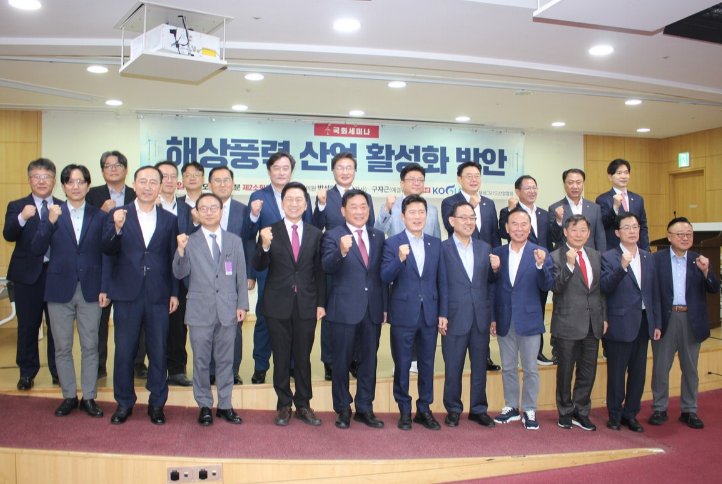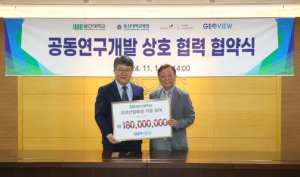Reporter Ahn Sang-min (tkdals0914@electimes.com) Published on September 5, 2024, at 18:35
- The Offshore Grid Industry Association Holds Industry Activation Seminar at the National Assembly on the 5th
- LCR, Effectively Banned, Requires Workaround to Foster Domestic Companies
- This Year’s Bidding Roadmap, Avoiding Simple Low-Cost Bids, Praised for Helping National Interest
- Ministry of Trade, Industry, and Energy: “Reflecting on the Last Two Bidding Rounds, Please Watch Our Government Policies”
A call has been made for detailed policies to be introduced in the upcoming long-term fixed-price wind power contract bidding in October, which encourage the use of domestic supply chains while avoiding diplomatic and trade issues.
On the 5th, the Korea Offshore Grid Industry Association, along with People Power Party lawmakers Park Seong-min and Koo Ja-geun, held a seminar titled “Measures for Activating the Offshore Wind Power Industry” at the National Assembly Members’ Hall. About 100 representatives from domestic offshore wind power companies attended the event to discuss ways to localize the supply chain.
Offshore wind power requires large-scale capital, creating high entry barriers, and in an industry where only the winners survive, less competitive companies tend to be eliminated. Therefore, government support is essential to nurture domestic supply chain companies that are still lacking in capacity.
However, countries that have implemented Local Content Requirement (LCR) policies to favor domestic supply chains have mostly withdrawn these policies due to concerns about trade friction. Taiwan, which has maintained LCR until recently, is also under pressure from the EU to withdraw its policy, along with the UK and India.
In South Korea, the Local Content Requirement (LCR) policy was introduced in 2022, offering up to 4.9 times the Renewable Energy Certificate (REC) weighting for projects with more than 50% domestic component usage. However, less than a year later, in April 2023, the policy was scrapped due to trade pressure from the EU.
Despite this, the industry agrees that nurturing the domestic supply chain is essential to prepare for the expanding offshore wind power market both domestically and internationally. Given South Korea’s strong manufacturing capabilities compared to neighboring countries, there is optimism that, with government support, domestic production is highly achievable.

Rep. Park Seong-min of the People Power(National Assembly’s Committee on Trade, Industry, Energy, SMEs, and Startups) stated, “Offshore wind power is being considered as the most promising and efficient eco-friendly energy facility in South Korea, yet the development of the industry and government support have been slow. As a result, low-cost foreign equipment is disrupting the industry and even threatening energy security.” He emphasized, “While the Ministry of Trade, Industry, and Energy has made efforts to expand non-price criteria in this year’s bidding process, much more attention and support are still needed.”

Rep. Koo Ja-geun of the People Power (Budget and Settlement Special Committee) stated, “Foreign companies, including those from China, are encroaching on the domestic market by leveraging their price competitiveness and financial strength. In last year’s 1.4 GW offshore wind long-term fixed-price contract auction, all turbines were supplied by foreign companies.” He added, “This not only results in a loss of national wealth but also directly impacts national security, including undersea military facilities and communication networks. I hope this issue will be actively discussed.”
▶ Encouraging domestic parts without LCR
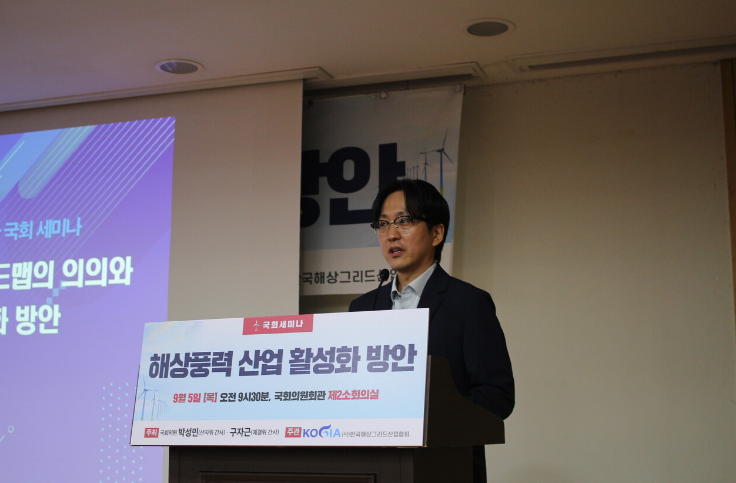
Lee Seul-gi, a researcher at the Korea Industrial Development Institute, gave a presentation on the topic “Significance of the Offshore Wind Competitive Bidding Roadmap and Measures for Activating the Domestic Industry,” emphasizing the need for government support to foster the domestic supply chain. Her analysis suggests that policies encouraging domestic supply chains should be considered from the perspectives of resource security and industrial health to avoid trade conflicts.
First, the researcher explained that public R&D should be carried out with plans to link the results to commercialization. While the wind power industry is experiencing a trend of larger turbines and generators, domestic companies are struggling to keep up. As a result, there is a growing call for creating commercialization zones to allow latecomer domestic turbine manufacturers to build track records. The Ministry of Trade, Industry and Energy has already provided large-scale R&D support to domestic turbine companies, but the focus should be on linking technology development with commercialization, rather than stopping at just research.
The researcher also emphasized that strengthening resource security and industrial health evaluation criteria can protect the domestic industry. She explained that domestic components could be favored by giving priority to equipment suited to Korea’s wind resources or by requiring rapid procurement of essential parts in the event of malfunctions during the operational phase.
Japan measures domestic manufacturing and procurement capabilities through non-price scoring in its bidding process, while the UK evaluates health and safety standards and workplace environments to control foreign supply chains.
Lee Seul-gi concluded, “The wind power market relies on learning effects and economies of scale, so even without LCR, we must protect our supply chain through alternative measures.”
▶ Importance of Fostering the Supply Chain, Ministry of Industry and Industry Agree
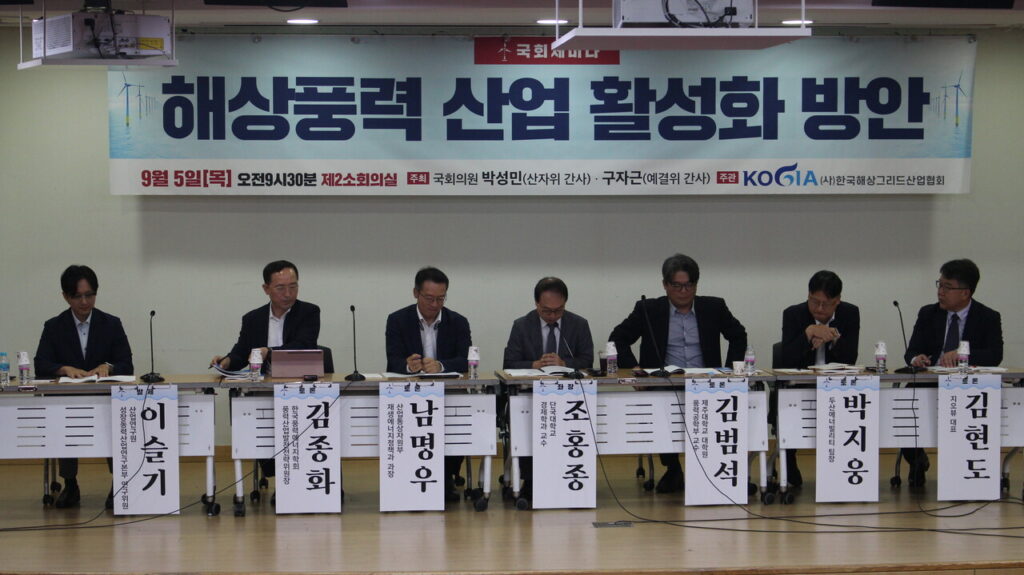
The panel discussion that followed was moderated by Professor Cho Hong-jong of Dankook University, with panelists including ▲ Nam Myung-woo, Manager at the Ministry of Industry ▲ Kim Beom-seok, Professor at Jeju University ▲ Kim Jong-hwa, Chairman of the Wind Energy Industry Development Strategy Committee at the Korean Wind Energy Association ▲ Park Ji-woong, Team Leader at Doosan Enerbility ▲ Kim Hyun-do, CEO of GeoView.
Professor Kim Beom-seok of Jeju University stated, “Through the recently announced offshore wind competition bidding roadmap, I believe the government’s commitment to avoiding simple low-price bids and selecting projects that benefit the national interest has been clearly communicated to the market. Energy security has become a recent issue, and the most important aspect is the stable operation of wind farms and maintaining power supply availability. To build a balanced supply chain, it is necessary to encourage foreign companies to invest in Korea and create jobs, and through joint venture partnerships, it is important to enable domestic companies to supply our equipment to foreign-made turbines, which is crucial for industrial development.”
Kim Jong-hwa, Chairman of the Wind Energy Industry Development Strategy Committee at the Korean Wind Energy Association, said, “Our country started the offshore wind industry with the ambition to become one of the top three countries in offshore wind power in 2011, but we have since been overtaken by Japan, Taiwan, and Vietnam due to a lack of institutional and policy support. However, the global market still evaluates Korea’s supply chain and human resource potential highly. Above all, the government must fully commit to institutional and policy efforts to activate the market. While it is difficult to fully localize all supply chains, support through selective focus is necessary.”
Park Ji-woong, Team Leader at Doosan Enerbility, stated, “This is the third year of offshore wind bidding, and I believe we are still in a transition period. The three most important factors in the bidding system are market volume projections, price, and evaluation weighting. It is notable that for the first time, market projections have been included. This market outlook and predictability will be factors that drive market formation, investment attraction, and supply chain development in the future. Since detailed evaluation methods have not yet been fully disclosed, we need to continue to monitor the situation, but I hope that the policy will be well implemented and contribute to the activation of domestic production.”
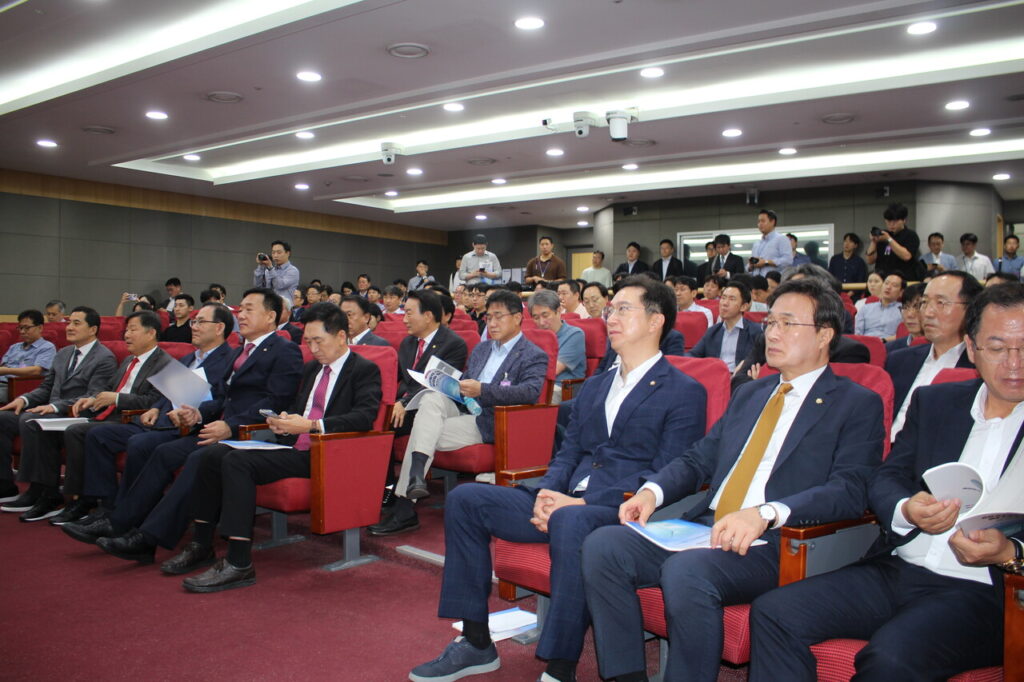
Kim Hyun-do, CEO of Geoview, stated, “Until now, the offshore wind market in our country has been an open market for foreign companies. Even when we requested technical exchanges with foreign companies, it was difficult to receive cooperation because foreign companies could handle everything on their own. Developing a single site requires over 100 supply chain companies, and the small and medium-sized enterprises that actually do the work need to grow in order to foster the industry. To achieve this, we also need to think about how to filter out foreign companies posing as domestic supply chain firms.”
Nam Myung-woo, Director of the Renewable Energy Policy Division at the Ministry of Trade, Industry and Energy, commented, “Because there are potential trade issues, it is not easy to design a system that focuses solely on domestic industry activation. However, everyone agrees on the necessity of offshore wind, and the government is working to find ways to activate the industry. We have reflected a lot on the results of the two bidding rounds in 2022 and 2023. The biggest issue was communication between the industry and experts. Moving forward, we are focusing on strengthening communication, and I hope that you will patiently observe the policy direction led by the government.”
Source: Electric Times (https://www.electimes.com)


